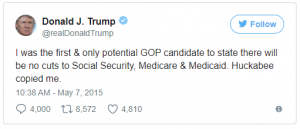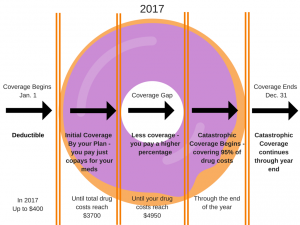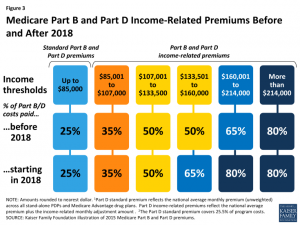During his campaign, President Donald Trump promised not to cut Medicare.1


However, by supporting the repeal of the Affordable Care Act (ACA), it can be argued that President Trump may be indirectly supporting cuts to Medicare. Allow me to explain…
So what does the Affordable Care Act have to do with Medicare anyways?
Free Preventative Care
The Affordable Care Act increased the amount of free preventative care for older adults enrolled in Medicare.2 These free services include screenings for cancer, blood pressure, cholesterol, and depression, immunizations, a yearly wellness visit, and programs to help people manage chronic diseases.2,3 Researchers studying the effects of these policy changes have already seen positive outcomes. For example, free cancer screenings have led to a significant increase in the number of early-stage colorectal cancer diagnoses in older adults; this means doctors are catching colorectal cancer earlier, are able to begin treatment earlier, and patients have better outcomes.4
Prescription Drug Costs
The Affordable Care Act also made changes to Medicare Part D. Medicare Part D covers prescription medications.5 A major issue with Part D prescription coverage since it was enacted in 2003, is the high costs of prescription medications for older adults and people living with a disability who fall within the “donut hole.” People in the donut hole have to pay the total cost of their medications until they spend enough to qualify for coverage again. In 2010, Part D beneficiaries had to pay a $310 deductible and a 25% copay per prescription until they reached the $2830 cover gap limit.6 After that point, they paid 100% of their prescription costs until they spent over $6,440. In 2017, the gap is between $3,700 and $4,950; so once a beneficiary reaches $3,700, they have to pay 100% of their prescription costs until they reach $4,950.7
Unsure if you or a loved one are close to the donut hole? Consult your explanations of benefits (EOB) statement that is sent to you each month. This will let you know how much you have spent on medications already, and how close you are to the coverage gap.

https://boomerbenefits.com/medicare-part-d-plans/the-donut-hole/
An estimated 25% of Medicare Part D beneficiaries reach this coverage gap. Unfortunately, many cannot afford to pay the full cost of their prescription medications until they reach the other side of the coverage gap. This means there are older adults who either stop taking their medications or reduce their medication usage to make their medications last longer. Thanks to the Affordable Care Act, the “donut hole” is projected to be closed by 2020. This means older adults will no longer have to pay 100% of their prescription costs when they spend a certain amount on medications. Thus, repealing ACA will increase out-of-pocket prescription costs for older adults.
Medicare Trust Fund
The Affordable Care Act extended the life of the Medicare Trust Fund that helps pay for Medicare.3 Prior to the Affordable Care Act, the Medicare Trust Fund was projected to not have enough money to pay for Part A (hospital insurance) benefits by 2017; current projections show funding has been extended through 2029.8,9,10 This was done with revisions that cut down payments to healthcare providers and insurers, increased funding, and created more accountability for healthcare providers to provide higher quality, more cost efficient services.
The Congressional Budget Office (CBO) estimated that a full repeal of the Affordable Care Act would increase Medicare costs by approximately $802 billion by 2025.11 The majority of that increase ($715 billion) would be because healthcare providers and private insurers (e.g., Medicare Advantage plans) would not be restricted in how much they charge for services or coverage. The Kaiser Policy Institute notes that repealing these changes would likely result in higher Medicare premiums and deductibles and reduce the life of the Medicare Part A trust fund.8
Another way the ACA saved money was to reduce the amount of money paid out to hospitals to cover the costs of treating uninsured or low-income patients.8 With ACA in place, the expectation was that there would be less patients without health insurance.
Further, the Affordable Care Act increased funding for Medicare Part A in 2013 by adding a 0.9% increase to the Medicare Part A payroll tax of workers making more than $200,000 (individual) or $250,000 (couple).12 Additionally, premiums for Medicare Part B and Part D enrollees were increased for those in higher income brackets.

Putting it all together…
In summary, the Affordable Care Act is connected to Medicare. When the Affordable Care Act was passed it: increased free services to keep older adults healthy; decreased the amount of out-of-pocket prescription drug costs; increased funding for Medicare so that the program would be available for older adults for years to come; and put restrictions on the amount of money healthcare providers and insurers can charge. When discussions of repealing or reforming the Affordable Care Act start to happen again, it will be important to look at how that will impact these changes.
References
______________________________________________________________________________________________________________________________________
- http://www.ontheissues.org/Donald_Trump.htm#Health_Care
- https://www.healthcare.gov/preventive-care-adults/
- https://www.medicare.gov/about-us/affordable-care-act/affordable-care-act.html
- Lissenden, B., & Yao, N. (2017). Affordable Care Act Changes to Medicare Led To Increased Diagnoses Of Early-Stage Colorectal Cancer Among Seniors. Health Affairs, 36(1), 101-107 7p. doi:10.1377/hlthaff.2016.0607
- https://www.medicare.gov/part-d/
- Bonakdar Tehrani, A., & Cunningham, P. J. (2017). Closing the Medicare Doughnut Hole: Changes in Prescription Drug Utilization and Out-of-Pocket Spending Among Medicare Beneficiaries With Part D Coverage After the Affordable Care Act. Medical Care, 55(1), 43-49.
- https://boomerbenefits.com/medicare-part-d-plans/the-donut-hole/
- http://www.kff.org/health-reform/issue-brief/what-are-the-implications-of-repealing-the-affordable-care-act-for-medicare-spending-and-beneficiaries/
- http://www.kff.org/medicare/issue-brief/the-facts-on-medicare-spending-and-financing/
- https://www.cms.gov/Research-Statistics-Data-and-Systems/Statistics-Trends-and-Reports/ReportsTrustFunds/Downloads/TR2016.pdf
- https://www.cbo.gov/publication/50252
- http://www.kff.org/medicare/issue-brief/medicares-income-related-premiums-a-data-note/
